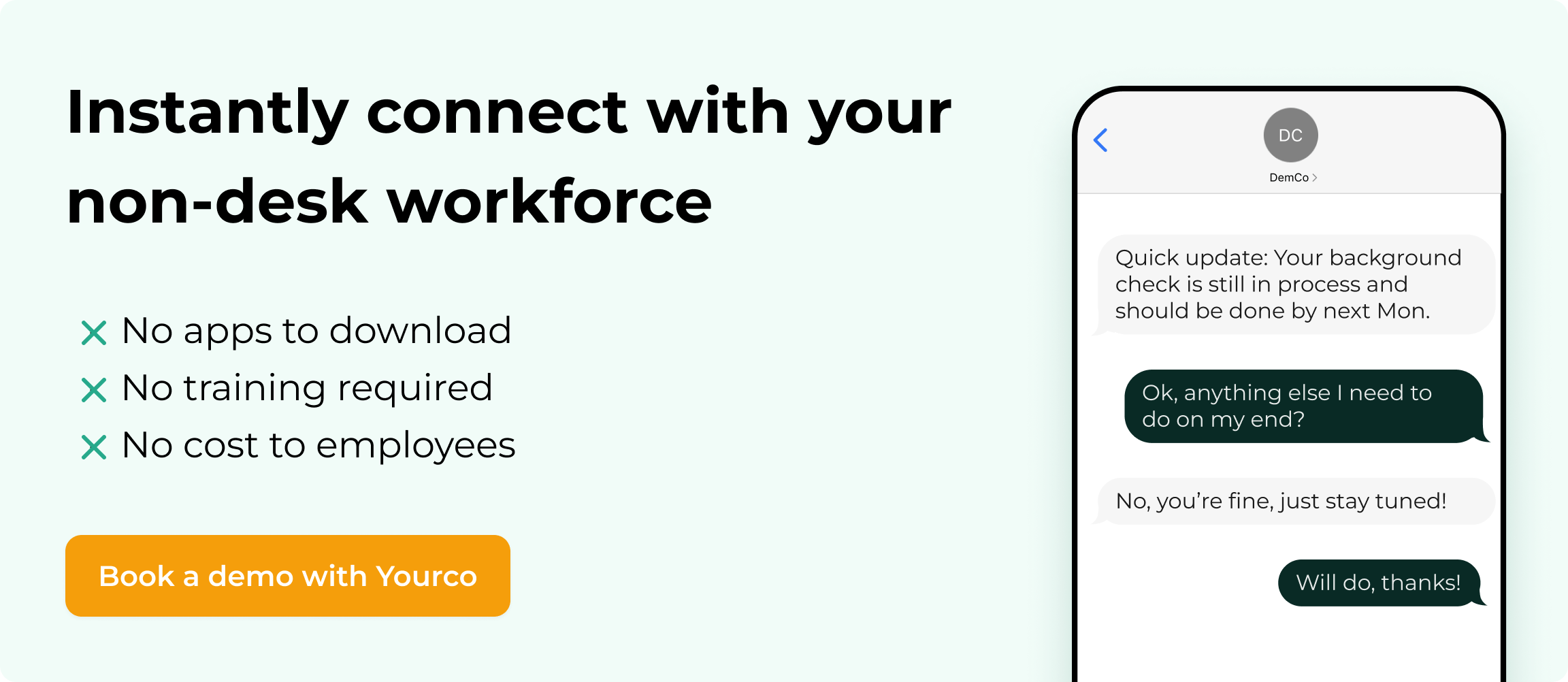Daily Task Tracker Templates for Hospitality Teams

Picture the morning shift at a busy hotel. Housekeeping scrambles to coordinate room turnovers while the front desk fields guest requests that never reach the right staff. Down in the kitchen, prep cooks wonder which dishes need priority while servers upstairs wait for answers about table assignments. Before the first guest interaction, confusion has already stolen precious minutes. For most hospitality teams, paper systems and scattered updates make daily coordination harder than it needs to be. Tasks go unassigned, messages get lost, and no one can see what's done.
A simple daily task tracker keeps every worker aligned, accountable, and connected to the same plan, no matter where they are.
Download Our Free Daily Task Tracker Templates
The right template keeps work clear, consistent, and easy to manage across shifts. Use these free Daily Task Tracker Templates to organize your hospitality or restaurant team’s day from start to finish.
These templates are built for flexibility, with columns for task names, owners, due times, and completion status. You can:
- Rename or hide columns to match your workflows.
- Add notes or photos from the floor for real-time context.
- Share the same link by text so every worker sees the latest version.
Once downloaded, customize it for your department:
- Housekeeping: Track room turnovers by floor, prioritize VIP rooms, track maintenance issues.
- Kitchen & Food Service: Assign prep tasks by station, monitor food safety checks, monitor service timing.
- Front Desk & Guest Services: Manage check-ins, coordinate guest requests, update concierge tasks.
- Events & Banquets: Plan setup sequences, assign breakdown duties, coordinate vendor arrivals.
Start with one shift, get feedback, then scale across all teams. When every worker can access the same clear list on their phone, you turn daily plans into finished work, without paper trails or confusion.
Build a Daily Task Tracker That Actually Works
If you decide to build your own tracker, make sure it works on every phone, and keep it simple. A mobile-friendly system gives everyone the same, up-to-date list without forcing you to shuffle papers or refresh email threads. When the whole crew can open a single screen and see what matters now, you stop wasting time on "Did you do this yet?" check-ins and start finishing work.
A reliable template keeps the moving parts organized. Your foundation should include:
- Clear categories and priorities so urgent fixes (like a last-minute banquet setup or VIP room preparation) never hide under routine chores
- A named owner for every assignment, leaving no doubt about who does what
- Deadlines and estimated hours that set clear time expectations
- Status fields that flip from "Not started" to "Done" in seconds to keep momentum flowing
- A notes box for quick context or photos from the floor
- A manager sign-off column that locks accountability in place
Choose mobile-first features that work for teams on the move:
- Big buttons and clean text for easy reading in busy kitchens or bright dining areas
- Auto-filled fields that reduce typing
- Offline syncing for back-of-house areas or basement storage
- Quick loading that opens fast on older devices
These choices tackle the headaches you face every day: fragmented updates, missed messages, and endless status chases. By keeping things simple and focusing on quick access, you hand your team a tool they'll use, turning daily checklists into finished work instead of forgotten assignments.
Roll Out Daily Task Trackers Across Your Hospitality Teams
Start small with a pilot team, learn what works, then scale across all locations. This approach keeps daily operations running smoothly while you work out any issues.
Choose a pilot team you trust to give honest feedback. Load your template, remove any fields they don't need, and change labels to match how your team talks. Since mobile-friendly systems work directly from phones, your pilot group can start logging duties between shifts without any new equipment.
Once the basics work well, follow a structured rollout process:
- Train supervisors first so they become your on-site problem-solvers and set the tone for everyone else.
- Walk frontline workers through one live entry so they feel the tap-by-tap flow.
- Collect feedback daily through short voice notes or a quick two-question text survey instead of long forms.
- Adjust the template by hiding unused columns, adding quick-select status options, or swapping icons for text if some phones don't display graphics well.
Expect some resistance. Some workers will stick to paper, others may forget to update status until shift end. Keep momentum by celebrating quick wins like "Line 3 cut inspection time by 15 minutes this week" or "Housekeeping turned over all checkout rooms 20 minutes faster yesterday" and sending gentle reminders instead of harsh emails. Pair slower adopters with early users to share tips in real time.
Track progress using floor-level metrics: completion rates, fewer re-works, and faster issue reporting. Most systems show this data in dashboards, or you can export weekly "planned vs. done" comparisons. When completion stays above 90% and supervisors spend less time chasing updates, your system is working. Copy the final template to every site and maintain the same feedback process so improvements continue.
Keep Your Task Trackers Accurate and Effective Over Time
Your tracking system only works when it stays current and useful. You need a straightforward approach for removing outdated assignments, adding new ones, and learning from what your team completes each shift.
Set up quick weekly reviews with supervisors to clean up your lists. Drop items that no longer matter and rewrite anything that's unclear. If workers can't understand a duty in one read, it slows everyone down. While you're at it, check the completion times your system records. When teams consistently finish late, it usually means instructions aren't clear or they're missing the right tools.
Make verification simple for your hospitality workers. They're already busy, so ask for just a photo, checkbox, or quick note. Use forms that work offline too, since crews in dead zones can sync their updates once they're back online. Complex forms kill adoption fast.
Your completed records reveal important patterns. Export the data to spot bottlenecks, identify retraining needs, and recognize top performers. Consider these insights:
- When one team finishes room turnovers 20% faster than others, find out what they do differently and share it.
- If kitchen equipment checks keep showing issues at the same station, schedule maintenance before it disrupts service.
- When breakfast prep consistently runs behind schedule, review your task sequence to identify bottlenecks between kitchen and service staff.
- If guest-facing tasks like room turnover show completion delays on weekends, adjust staffing levels before peak checkout times.
By keeping your lists current, making verification quick, and acting on the trends you discover, you transform simple checklists into a powerful tool for better performance, stronger safety habits, and cleaner compliance records.
Keep Your Hospitality Team Connected with Yourco
Managing daily task distribution shouldn't require your team to hunt down computers or struggle with spotty Wi-Fi. Yourco helps you communicate task assignments directly to your workers' text inbox, the one place they check constantly throughout their shift. This SMS-based approach eliminates the mobile access barriers that bog down teams who can't easily reach desktop tools or deal with unreliable internet connections.
When you send task updates via Yourco, each message includes clear instructions and workers can reply instantly to confirm receipt or ask questions. You get automatic time stamps on all communications, giving you a record of when information was sent and received without chasing people down. Since all replies stay in the same thread, you build a complete communication trail with no extra paperwork or spreadsheet juggling required. Your team can even text back photos or quick notes when they spot problems, keeping everyone informed in real time. Whether it's a maintenance issue in a guest room, a supply shortage in the kitchen, or a last-minute event request, your hospitality team can report and respond instantly.
Yourco's AI-powered translation feature ensures language barriers don't slow down your daily communications. With support for 135+ languages and dialects, everyone on your diverse team receives task instructions in their preferred language. The platform requires no downloads, no passwords, and no training sessions.
Also, with Yourco’s AI-powered Frontline Intelligence, you uncover trends. By typing simple prompts, Yourco can generate instant summaries of task completion rates, response times, and productivity patterns, giving you a month-over-month view of how your team is performing. Yourco surfaces real-time insights that help organizations optimize staffing, improve workflows, and make informed decisions without running a single report.
Try Yourco for free today or schedule a demo and see the difference the right workplace communication solution can make in your company.
Frequently Asked Questions
What is the easiest way to track daily tasks for hospitality teams?
The simplest approach is a mobile system that loads fast, works offline, and needs only a few taps to update status. A good mobile tracker lets you check today's list, mark items done, and add quick notes, all from the phone already in your pocket. If your crew has limited data or older devices, an SMS checklist keeps everything even lighter.
Can I use these templates across multiple job sites?
Yes. Most templates let you copy your setup for each location and view progress from all sites in one place. Look for tools that support copying templates and location tags so you don't have to rebuild the same checklist every time a new site opens.
How can I customize a daily tracker for my team?
Start with a flexible template, then add fields that match how you work: shift codes, safety checks, or photo proof. Most platforms let you rename columns, change statuses, and hide anything you don't need. Keep the layout clean so workers see only the assignments that matter to them.
How can hotels and restaurants use task trackers across multiple departments?
Set up separate groups for housekeeping, food and beverage, maintenance, and front desk. Each department sees only their relevant tasks, but managers can view the full picture across all areas. Use priority tags to flag guest-facing issues that need immediate attention, like room service delays or maintenance requests that affect occupied rooms.
What's the difference between a digital and SMS-based task tracker?
Most digital task trackers expect employees to download an app and stay connected to Wi-Fi or mobile data. While those tools offer dashboards and advanced features, they’re often out of reach for frontline teams using basic or shared phones. That creates barriers to adoption and slows down execution.
Yourco takes a simpler path. Our SMS-based task tracker works instantly on any mobile phone, even flip phones, with no app to install, no passwords to remember, and no training required. But simplicity doesn’t mean limitation. Behind every text message is a powerful frontline intelligence engine that delivers real-time responses, live status updates, and detailed reports generated through quick AI prompts.




